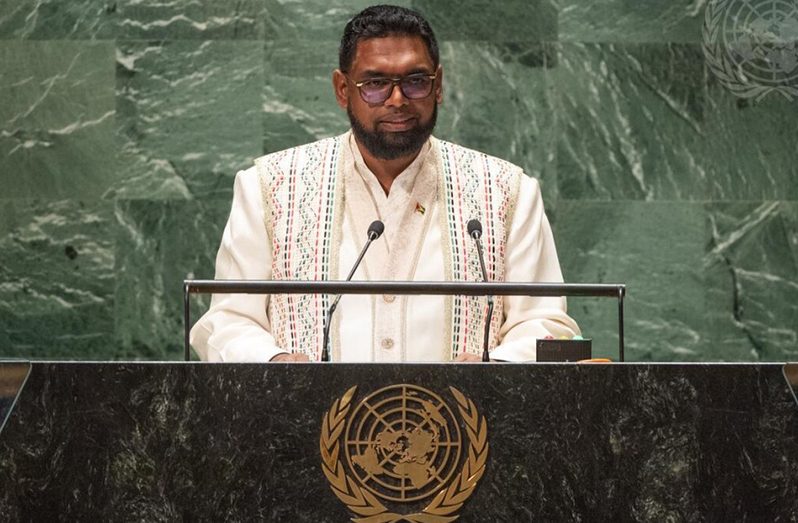President Ali tells UN, as the country’s western neighbour reiterates territorial claims
By Naomi Parris
ALTHOUGH the International Court of Justice (ICJ) has yet to deliver a decree on the Guyana-Venezuela border controversy, the Bolivarian Republic has continued its claim over the country’s territory, and Guyana’s President, Dr. Irfaan Ali has affirmed that no effort will be spared to safeguard its sovereignty.
Dr. Ali, while addressing world leaders at the 78th sitting of the United Nations General Assembly in New York on Wednesday, said that Venezuela must honour its obligation under the charter of the UN to respect the rule of law.
“It is sad that 57 years after Guyana’s Independence we remain threatened,” President Ali said.
Venezuela’s most recent claims were made on Tuesday via a Communique, which stated that Guyana does not have the jurisdiction to bid on oil blocks located in its own waters.
President Ali has since responded to the country’s recent claims.
He, however, reiterated to leaders at the UN that Guyana will spare no effort in defending its sovereignty and territorial integrity.
“Guyana considers this a threat to regional and international peace and security, as well as to Guyana’s investment partners…We demand that Venezuela honours its obligation under the Charter to pursue only peaceful means to settle any disputes it may have with Guyana, including adjudication before the International Court of Justice,” President Ali said.
The Guyanese Head of State believes that a peaceful resolution within the courts will be equitable, and in line with international law.
In April of this year, the World Court ruled that the case Guyana brought before it seeking to affirm the validity of the 1899 Arbitral Award settling the boundaries between it and Venezuela was admissible.
This meant that the court could move forward with hearing the substantive case on its merits, of whether the 1899 arbitral award settling the boundaries of the two countries is valid and binding.
Just last week, President Ali, during an address to the Permanent Council of the Organisation of American States’ Protocolary Meeting in Washington, D.C., said that accepting established borders has always been a feature of the country, as it supports a peaceful resolution of issues.
The country’s most recent claims have since seen several global leaders, including OAS Secretary-General Luis Almagro, supporting Guyana.
Guyana moved to the ICJ with its case in March 2018, challenging the non-participating Bolivarian Republic of Venezuela over its disagreement on the legal validity and binding effect of the 1899 Award.
Venezuela maintained that the ICJ was without jurisdiction to hear the case and refused to participate in the court proceedings.
The Spanish-speaking country had claimed that it is the “sole indisputable inheritor” of the Essequibo region and the Monetary Gold Principle.
Although Venezuela had claimed that the ICJ did not have jurisdiction to hear the substantive case, the country made a U-turn following the court’s December 2020 ruling on that aspect of the case. Venezuela, on that occasion, contended that Guyana had no standing on the matter.
Venezuela had argued that the United Kingdom was the proper party since the territory was “given” to Guyana by the British. However, the ICJ found that Venezuela’s objection on the basis of the Monetary Gold principle is an objection to the exercise of the court’s jurisdiction and thus does not constitute an objection to jurisdiction.
Based on a thorough analysis of the facts and relevant legal precedents, the ‘World Court’ also found Venezuela’s preliminary objection was admissible on this ground.
The court found that in view of the above, the practice of the parties to the Geneva Agreement further demonstrates the two countries’ agreement that the dispute could be settled without the involvement of the United Kingdom.
The court unanimously rejected Venezuela’s objection.
Guyana is seeking a final and binding judgement that the 1899 Arbitral Award, which established the location of the land boundary between then British Guiana and Venezuela, remains valid and that the Essequibo region belongs to Guyana and not Venezuela.



.jpg)









